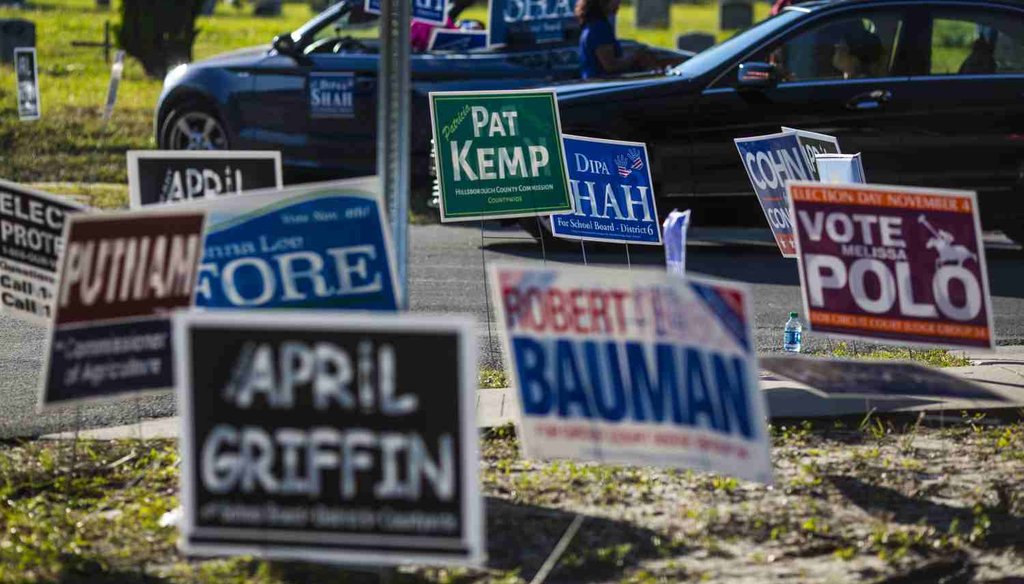Stand up for the facts!
Our only agenda is to publish the truth so you can be an informed participant in democracy.
We need your help.
I would like to contribute

Signs outside a polling place in Tampa, Fla. (Tampa Bay Times photo)
On Tuesday, millions of Florida voters will head to the polls to elect a governor, members of Congress and settle amendment questions including whether to allow medical marijuana.
Amid the battle between Republican Gov. Rick Scott and Democrat Charlie Crist, both candidates and activists have made claims about voter rights and elections.
Here’s a look back at some of our top fact-checks that relate to Florida’s botched attempt to purge noncitizens from the rolls, restoring voting rights for felons, the state’s early voting law and other claims related to elections.
Felons and voting
Crist has reached out to black voters in part by emphasizing his record on making it easier for certain felons to regain their right to vote.
Sign up for PolitiFact texts
"Here's Charlie's plan," Scott said during the CNN debate. "You commit a heinous crime, as soon as you get out of jail, you get to vote. Stalk, you get to vote as soon as you walk out. You have intentional permanent disfigurement of a child, you walk out of jail, you immediately get to vote"
We found Scott was distorting Crist’s position. The Cabinet under Crist made it easier for felons to get their rights restored, but they didn’t regain those rights immediately after leaving jail.
The offenders had to complete the terms of their sentence, including probation, to qualify. And then the Clemency Board had to sign off on the restorations. The most serious violent offenders had to undergo an investigation and hearing.
The only kernel of truth here is that it is possible that some felons who had committed violent crimes got their rights restored, but it wasn’t immediately upon leaving jail. So we rated this claim Mostly False.
In 2011, Scott and the Cabinet -- with a push by Republican Attorney General Pam Bondi -- reversed the changes under Crist. During Crist’s tenure about 156,000 felons regained their rights while that number dropped to about 1,600 under Scott.
Dan Gelber, a Crist advisor and a former state House Democratic leader from Miami Beach, claimed that Crist’s actions on restoration were historic. He wrote on Crist’s campaign website that Crist "sought for and got approved the automatic restoration of felon rights for nonviolent offenders for the first time in Florida history (since reversed by Governor Scott)."
We rated Gelber’s claim False, because Gov. Reubin Askew pushed for similar reforms in 1975. As a result of our fact-check Gelber added information about Askew’s role.
We also fact-checked a claim about where Florida ranks nationally on denying felons the right to vote. "Of the approximately 6 million disfranchised citizens in the Unites States, one-quarter are Floridians," said Desmond Meade, president of the Florida Rights Restoration Coalition."
The numbers came from research done two sociology professors -- Christopher Uggen of the University of Minnesota and Jeff Manza of New York University. They concluded that 5.85 million felons couldn’t vote nationally as of December 2010, including 1.5 million in Florida -- about a quarter. However, part of the researchers’ totals were based on an estimate of ex-cons who have completed their sentences but still can’t vote. We rated Meade’s claim Mostly True.
We recently interviewed Uggen, who told us it appears that Florida still leads the nation in the number of felons who can’t vote.
Noncitizen purge
In 2012, the state Division of Elections put together a list of about 180,000 potential noncitizens based on driver’s license data. The state later reduced that list to 2,600 -- and then again to about 200. Amid multiple errors and problems, the state scrapped their effort as Election Day approached. The state planned to embark on a second round, but Secretary of State Ken Detzner decided to delay that until after the 2014 election.
We have fact-checked many claims related to the purge, including one by Detzner.
His claim related to his plan to use a federal immigration database -- called the Systematic Alien Verification for Entitlements, or SAVE -- to purge Florida’s voter rolls.
Detzner defended the use of SAVE during a Nov. 4, 2013, hearing before the state Senate committee on ethics and elections. He said using SAVE to check voter registration is one of its primary uses.
"In fact, Homeland Security’s ‘benefit categories’ lists checking voter registration citizenship status as one of its main functions," he said. "The federal government allows SAVE to be used and check legal status as part of an ensuring the eligibility of registered voters."
A federal document listed voter registration as one of the benefits that SAVE data can be used for to check citizenship status. However, only a few states use it that way. SAVE is primarily used for agencies to check citizenship status for public benefits or driver’s licenses. For fiscal year 2013, voter registration queries equaled less than 1 percent of the searches. We rated this claim False.
Voting rights legal challenges
In July, Attorney General Eric Holder warned Scott that the feds are "carefully monitoring" voter access in Florida.
"I am deeply disturbed that during your tenure, your state has repeatedly added barriers to voting and restricted access to the polls," Holder wrote in a letter to Scott. Holder cited a series of changes to the state’s election law including to early voting.
But Scott’s campaign pointed the finger back at Holder:
"In fact, Attorney General Eric Holder’s own Justice Department precleared the voting changes in the 2011 law that governed the 2012 general election in Florida," Scott campaign manager Melissa Sellers wrote.
The Scott response was partially accurate but left out a lot of context. In 2011, the GOP-led Legislature cut the number of days of early voting from 14 to 8, among other election changes. The law, signed by Scott, allowed supervisors to offer between 48 hours and 96 hours of early voting over eight days.
Because of past discrimination, five counties in Florida -- Hillsborough, Monroe, Collier, Hardee and Hendry -- were subject to a section of the federal Voting Rights Act that required any voting-law changes to be precleared by the federal government. (Precleared simply means approved in advance.)
The state sought preclearance from a three-judge federal panel. The Justice Department told the court that the state had failed to prove it was protecting minorities from discrimination.
On Aug. 16, 2012, a federal judicial panel issued a ruling siding with the Justice Department and refusing to approve the changes. But the panel said the state could submit a plan showing it would offer the maximum number of early voting hours for those counties -- and that’s what the Scott administration did. Then, Holder filed a motion saying that his department didn’t object to that plan.
Scott’s statement omitted that the Justice Department only signed off on the state’s plan after it committed to offering the maximum hours in those counties. We rated Scott’s claim Half True.
After long election lines at some Florida polls in November 2012 made Florida again the butt of national jokes, the Legislature in 2013 revamped the state’s early voting law to give supervisors more flexibility to set hours.
In another fact-check, we looked at President Barack Obama’s claims about how aggressive the U.S. Justice Department was in investigating obstacles to voting. During the week of the 50th anniversary of the Civil Rights Act in April 2014, Obama gave a fiery speech in Manhattan in which he attacked Republicans for leading efforts to pass laws "making it harder, not easier, for people to vote" and noting that the Justice Department had "taken on more than 100 voting rights cases since 2009."
Those 102 cases included instances in which the department was the plaintiff, defendant or played some other role. So the Justice Department didn’t initiate the action in all of those cases. Because Obama was vague about what he meant by "taken on" cases we rated this claim Half True.
Our Sources
See individual fact-checks for sources


































